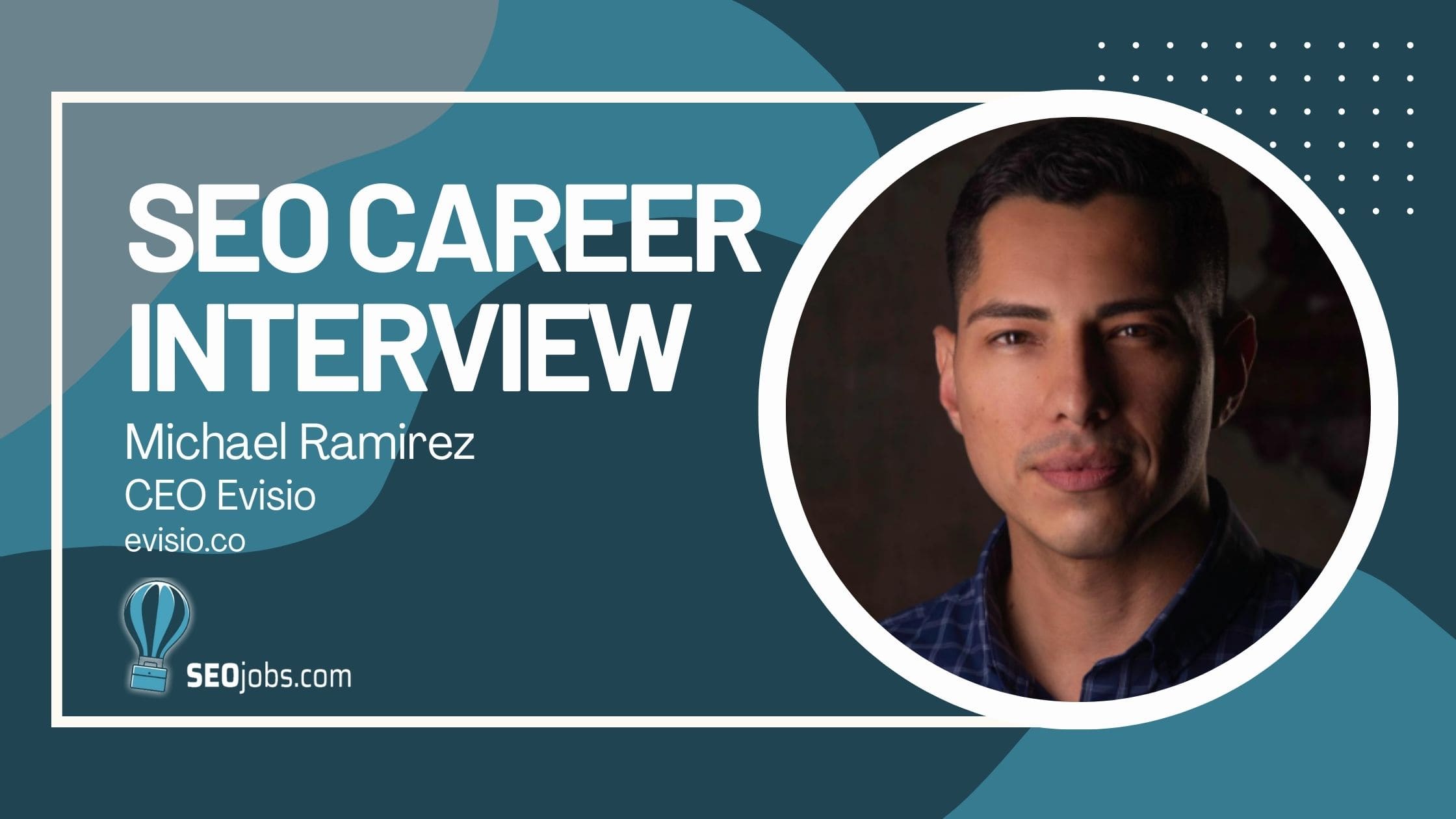Hi! 👋 We’re so glad to feature you on SEOjobs.com. Please introduce yourself to our site’s readers.
My name is Michael Ramirez (Twitter | LinkedIn) and I’m an SEO consultant turned product guy. I’m based in Austin, TX, and have been working in SEO for approximately 14 years. But the road was long and hard to get to where I am today as I came from humble beginnings.
My story started in San Antonio’s Westside, which was spotlighted in a documentary 50 years ago called ‘Hunger In America’ for its deep-rooted poverty and ties to Mexican culture. Citing research from Trinity University professor Christine Drennon, things haven’t changed much since. “The report highlights 78207, […] for having high poverty and unemployment rates and limited numbers of people with high school diplomas and health insurance. In the West Side neighborhood where Lanier High School is located, just 53% of adults have a high school diploma.
I made it through, and love sharing how to thrive in tough environments, dealing with stress and anxiety, my educational and career path, and my journey toward changing the economic conditions for my family.
Please share with us your current SEO role and for what company you work for.
Since May 2022, when I was let go from my corporate job, I decided to go all-in on a project that I first had the idea for back in 2017. It was one of those, “this is a cool idea, but I have no idea where to start or how to build it. But maybe one day.” It felt like that one day found me after I was let go.
With that said, I’m now the self-appointed CEO of my own SEO Saas company called evisio.co. Although telling people that line triggers congratulatory remarks, which I’m grateful for, I had no idea what it took to build and run a Saas company. My thinking was, to build a product, SEO the hell out of it, and wait for the mailbox money to arrive every day. Spoiler alert, it doesn’t happen that way, unless maybe you’re Neil Patel.
In order for me to find some kind of structure, I hired a business coach. This was one of the most important strategic decisions I made, especially early on in the company’s life. She helped me define my roles, decide what deserves my attention and resources and what doesn’t, how to build a solid operations game plan, how to measure my efforts, build confidence, and give me a kick in the ass when I need it.
As a newfound solopreneur, some of my responsibilities include:
- Operating as the product manager of our development team to ensure we stay focused on our core product roadmap, keep a good workflow pace, and keep everyone accountable
- Acting as the CMO (chief marketing officer) to search for promotional opportunities, partnerships, content strategies, and new trends to reach potential customers
- Chatting with prospective customers and users on their experience, ways to improve the product, and working these features into our product discussions and then eventually building them into our roadmap
- Envisioning the product’s maturity and growth. This is the fun part and the thing I enjoy doing the most. It means being the visionary for the company, getting creative, and thinking through the product’s life and direction.
Can you share with us how you entered the SEO industry?
While attending The University of Texas at Austin, I first learned about digital marketing and SEO. I majored in Advertising and needed a specialization in one of the three provided areas (a degree requirement): Media, Creative or Digital Marketing. Most of my colleagues were taking the traditional marketing route and specializing in Media and Creative fields, so I chose digital marketing.
That decision would pay off as I was able to land my first job in SEO at an advertising agency in Georgetown, TX, while many traditional marketing and advertising roles saw a decline due to the 2007-2008 financial crisis. Companies were cutting back on traditional advertising and going all-in on improving organic traffic and paying for ads on Google. Although my first job paid a whopping salary of $35K, I was just happy to be employed during this period and have my first role as a college grad.
After three years at the agency, I was laid off. The company fell on hard times and decided to close its operations. While one of the founders of the agency was delivering the bad news to me, I countered and asked if they would be open to letting me fulfill the service periods remaining on the SEO contracts. The founder thought about it for 24 hours and then agreed to my proposal. Literally overnight, I became an SEO consultant with my own official business. This was yet another time fate decided my path. I went on to work as a consultant since 2012, hopping in and out of the corporate world, until arriving at my current position with evisio.co.
How did you start to learn SEO? What are you currently doing to keep up with the ever-changing SEO industry?
I first learned a little about SEO in college, but most of my learnings came from my first job at the agency. At the time we had a consultant that went to one of Bruce Clay’s training programs in California and he basically acted as our coach. Over the course of 13 years in the industry, I’ve attended conferences, workshops, bought courses both online and offline, talked to experts, and spent thousands of dollars on educational content. After saying that, I recommend learning only what you need to at every stage of your project. Need to learn how to do a technical audit? Learn the best ways to do that first, find a process, and get the work done. That approach even works for tactical items. Need to learn how to fix a canonical tag issue for a site with multiple languages? Learn the best ways to do that first, find a process, and get it done. Don’t try to be a guru who claims to know it all, at least not from the start. Solve your problems and challenges first.
Can you share what factors are most important to you in an SEO career and why? When do you know it’s time for a new job? Do these same factors play a role?
Independence and ownership. These are my top factors and will always be. Whether I’m consulting, building my product, or even working a job, if I don’t have a sense of independence and ownership, I lose interest quickly. SEOs are unique in that we have access to a wide variety of online business models and search data that can be very lucrative. At the end of the day, you can continue to make someone else money, or you can shoot your shot and turn your time and attention toward making it for yourself. In my opinion, some of the most common areas to make money in SEO are service, education, and products. Choose one, stick with it, and measure your outcomes. It’s nice to have options!
What recommendations would you give to someone who is looking to join the SEO industry and get their first full-time SEO position?
Do it! You’ll learn much more about how Google works. You have the opportunity to learn:
- The different business models people use to make money on the internet
- If you own your own business one day, how to rule Google and drive traffic
- Valuable search data that can be used to build new products, resources, and materials that can be monetized
- How your skills can be transferable to other jobs, industries, and vertices. The skills you’ll learn in SEO will lend themselves to other roles
- Outside of the transactional stuff, SEOs are a diverse and competitive group that loves to have fun and take a lot of pride in their work

